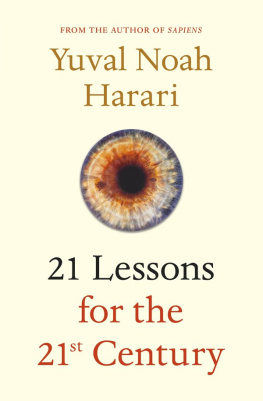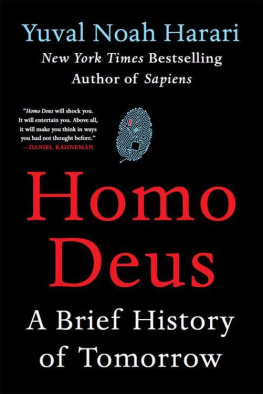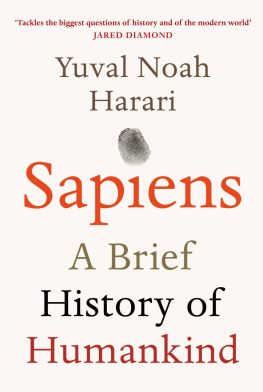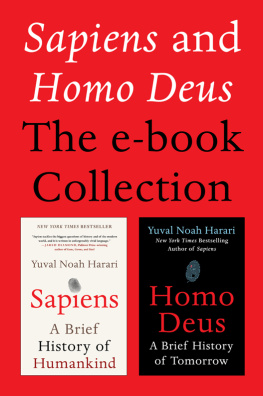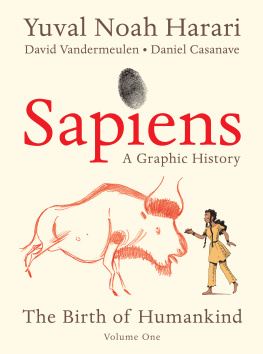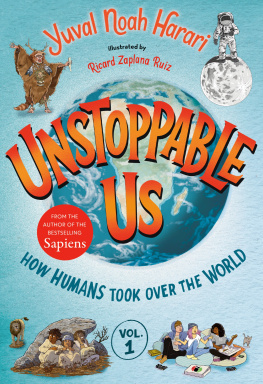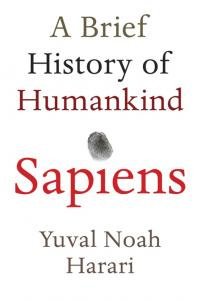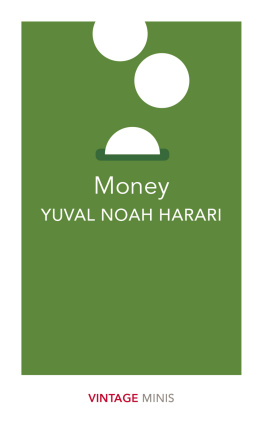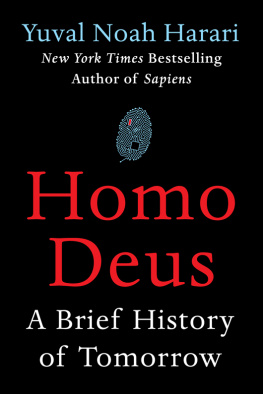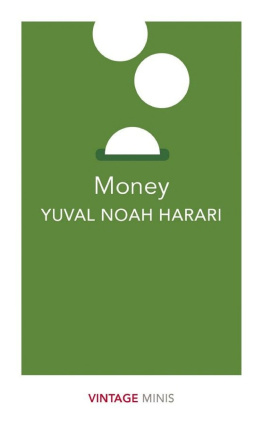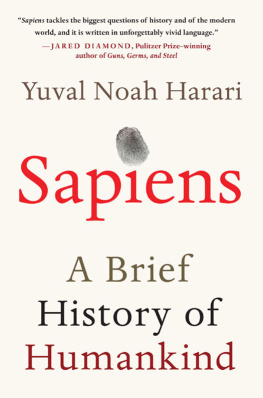Contents
The end of history has been postponed
When you grow up, you might not have a job
Big Data is watching you
Those who own the data own the future
Humans have bodies
There is just one civilisation in the world
Global problems need global answers
God now serves the nation
Some cultures might be better than others
Dont panic
Never underestimate human stupidity
You are not the centre of the world
Dont take the name of God in vain
Acknowledge your shadow
You know less than you think
Our sense of justice might be out of date
Some fake news lasts for ever
The future is not what you see in the movies
Change is the only constant
Life is not a story
Just observe
About the Book
FROM THE AUTHOR OF THE MILLION COPY BESTSELLER SAPIENS
Sapiens showed us where we came from. Homo Deus looked to the future. 21 Lessons for the 21st Century explores the present.
How can we protect ourselves from nuclear war, ecological cataclysms and technological disruptions? What can we do about the epidemic of fake news or the threat of terrorism? What should we teach our children?
Yuval Noah Harari takes us on a thrilling journey through todays most urgent issues. The golden thread running through his exhilarating new book is the challenge of maintaining our collective and individual focus in the face of constant and disorienting change. Are we still capable of understanding the world we have created?
About the Author
Yuval Noah Harari has a PhD in History from the University of Oxford and now lectures at the Hebrew University of Jerusalem, specialising in world history. His two books, Sapiens: A Brief History of Humankind and Homo Deus: A Brief History of Tomorrow, have become global bestsellers, with more than 12 million copies sold, and translations in more than forty-five languages.
ALSO BY YUVAL NOAH HARARI
Sapiens: A Brief History of Humankind
Homo Deus: A Brief History of Tomorrow
To my husband Itzik, to my mother Pnina, and to my grandmother Fanny, for their love and support throughout many years.
Introduction
In a world deluged by irrelevant information, clarity is power. In theory, anybody can join the debate about the future of humanity, but it is so hard to maintain a clear vision. Frequently, we dont even notice that a debate is going on, or what the key questions are. Billions of us can hardly afford the luxury of investigating, because we have more pressing things to do: we have to go to work, take care of the kids, or look after elderly parents. Unfortunately, history gives no discounts. If the future of humanity is decided in your absence, because you are too busy feeding and clothing your kids you and they will not be exempt from the consequences. This is very unfair; but who said history was fair?
As a historian, I cannot give people food or clothes but I can try and offer some clarity, thereby helping to level the global playing field. If this empowers even a handful of additional people to join the debate about the future of our species, I have done my job.
My first book, Sapiens, surveyed the human past, examining how an insignificant ape became the ruler of planet Earth.
Homo Deus, my second book, explored the long-term future of life, contemplating how humans might eventually become gods, and what might be the ultimate destiny of intelligence and consciousness.
In this book I want to zoom in on the here and now. My focus is on current affairs and on the immediate future of human societies. What is happening right now? What are todays greatest challenges and choices? What should we pay attention to? What should we teach our kids?
Of course, 7 billion people have 7 billion agendas, and as already noted, thinking about the big picture is a relatively rare luxury. A single mother struggling to raise two children in a Mumbai slum is focused on the next meal; refugees in a boat in the middle of the Mediterranean scan the horizon for any sign of land; and a dying man in an overcrowded London hospital gathers all his remaining strength to take in one more breath. They all have far more urgent problems than global warming or the crisis of liberal democracy. No book can do justice to all of that, and I dont have lessons to teach people in such situations. I can only hope to learn from them.
My agenda here is global. I look at the major forces that shape societies all over the world, and that are likely to influence the future of our planet as a whole. Climate change may be far beyond the concerns of people in the midst of a life-and-death emergency, but it might eventually make the Mumbai slums uninhabitable, send enormous new waves of refugees across the Mediterranean, and lead to a worldwide crisis in healthcare.
Reality is composed of many threads, and this book tries to cover different aspects of our global predicament, without claiming to be exhaustive. Unlike Sapiens and Homo Deus, this book is not intended as a historical narrative, but rather as a selection of lessons. These lessons do not conclude with simple answers. They aim to stimulate further thinking, and help readers participate in some of the major conversations of our time.
The book was actually written in conversation with the public. Many of the chapters were composed in response to questions I was asked by readers, journalists and colleagues. Earlier versions of some segments were already published in different forms, which gave me the opportunity to receive feedback and hone my arguments. Some sections focus on technology, some on politics, some on religion, and some on art. Certain chapters celebrate human wisdom, others highlight the crucial role of human stupidity. But the overarching question remains the same: what is happening in the world today, and what is the deep meaning of events?
What does the rise of Donald Trump signify? What can we do about the epidemic of fake news? Why is liberal democracy in crisis? Is God back? Is a new world war coming? Which civilisation dominates the world the West, China, Islam? Should Europe keep its doors open to immigrants? Can nationalism solve the problems of inequality and climate change? What should we do about terrorism?
Though this book takes a global perspective, I do not neglect the personal level. On the contrary, I want to emphasise the connections between the great revolutions of our era and the internal lives of individuals. For example, terrorism is both a global political problem and an internal psychological mechanism. Terrorism works by pressing the fear button deep in our minds and hijacking the private imagination of millions of individuals. Similarly, the crisis of liberal democracy is played out not just in parliaments and polling stations, but also in neurons and synapses. It is a clich to note that the personal is the political. But in an era when scientists, corporations and governments are learning to hack the human brain, this truism is more sinister than ever. Accordingly, this book offers observations about the conduct of individuals as well as entire societies.

